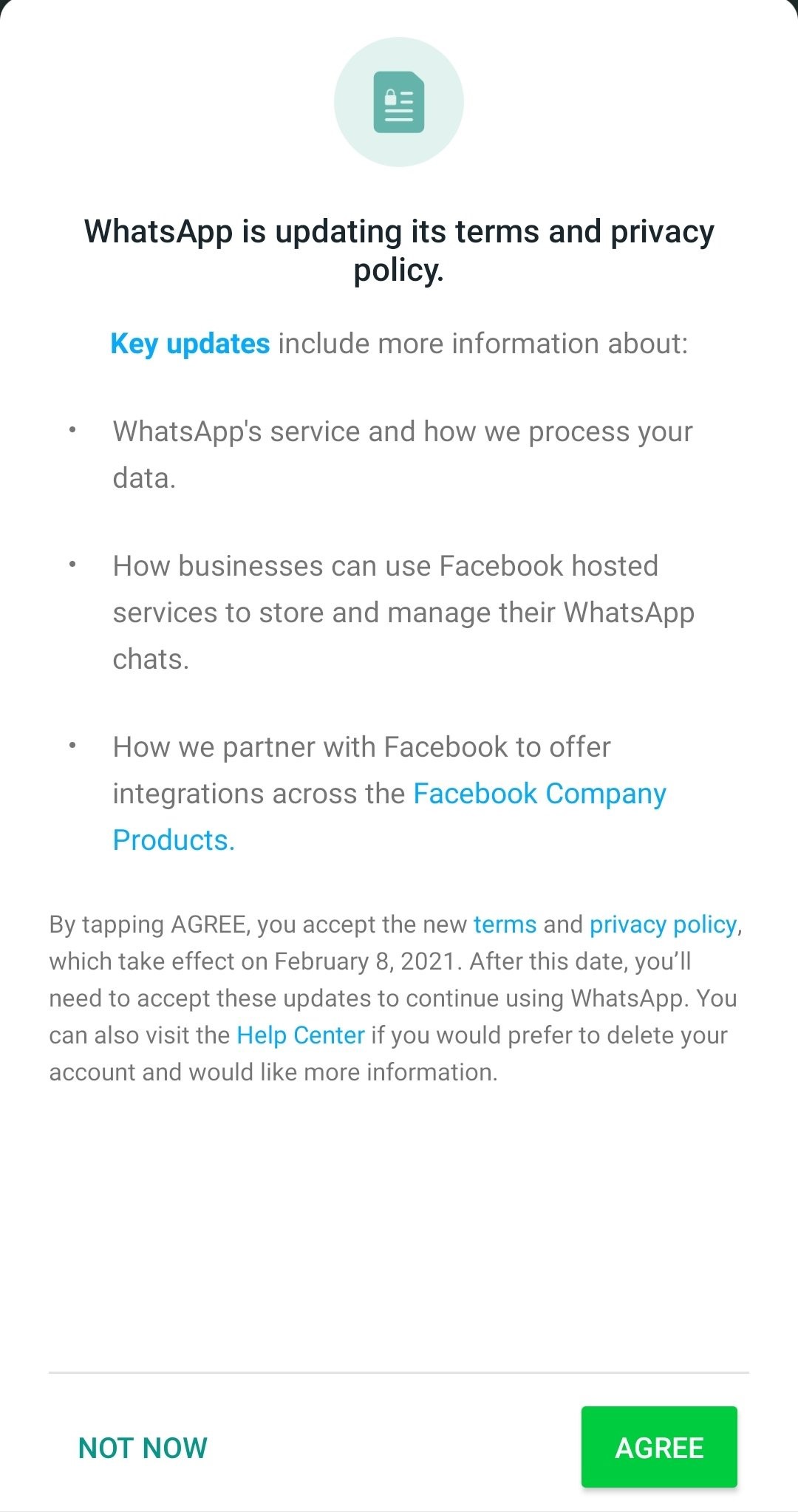Recently on 04 January 2021, WhatsApp released an in-app notification forcing users to accept its revised privacy policy by 08 February 2021 or stop using its service entirely.

Essentially accepting this privacy policy takes away the choice users had until now to not share their data with other Facebook-owned and third-party apps. If users do not agree with the updated privacy policy of the messaging platform, they will have to quit WhatsApp by 08 February 2021 when the new terms of service are set to come into effect.
However, this is not the first time WhatsApp has changed its privacy policy to facilitate sharing of data with its parent company, Facebook. To understand what is happening, we must rewind the clock and take ourselves back to February 2014 when WhatsApp was first acquired by Facebook for USD 22 billion.
Background
When Facebook was considering acquiring WhatsApp, privacy activists read the writing on the wall and warned about potential data sharing between WhatsApp and Facebook. To allay these concerns, executives from WhatsApp publicly committed never share data with Facebook. Based on these assurances, regulators such as the European Commission and the Federal Trade Commission greenlit the acquisition of WhatsApp by Facebook.
Fast forward to August 2016, WhatsApp announced that it would start sharing some data with Facebook including phone numbers and last seen activity. At that time, WhatsApp stated the changes in its privacy policy would allow Facebook to offer better friend suggestions and more relevant ads to its users. Users were given 30 days to opt-out of sharing data with Facebook for ad targeting purposes but if they failed to exercise that option within 30 days, they would have no choice but to consent to data sharing. Any new users who joined after August 2016 would also not have the choice to opt out of sharing data with Facebook.
The regulators who had approved Facebook’s acquisition of WhatsApp based on its commitments about preserving user privacy did not take to this volte face kindly. In 2017, the European Commission fined Facebook 110 million Euros for providing misleading information during the WhatsApp acquisition about its technical inability to link the identities of users across WhatsApp and Facebook. Prior to this in 2016 itself, data protection authorities in Germany the United Kingdom directed Facebook to stop collecting data of WhatsApp users.
January 2021
WhatsApp rolls out its new privacy policy which confirms that Facebook may now have access to messages shared with businesses on WhatsApp and it provides more insight into expansive meta data collection by WhatsApp.
Changes in WhatsApp:
One of the many changes that the company has made pertains to the information that it collects as follows
Media:
When a user forwards media within a message, we store that media temporarily in encrypted form on our servers to aid in more efficient delivery of additional forwards.
Contacts:
If any of your contacts aren’t yet using our Services, we’ll manage this information for you in a way that ensures those contacts cannot be identified by us
Transactions and Payments:
If you use our payments services, or use our Services meant for purchases or other financial transactions, we process additional information about you, including payment account and transaction information needed to complete the transaction.
Device, Connection and Location Information:
We collect device and connection-specific information when you install, access, or use our Services. This includes information such as hardware model, operating system information, battery level, signal strength, app version, browser information, mobile network, connection information (including phone number, mobile operator or ISP), language and time zone, IP address, device operations information, and identifiers.
We collect and use precise location information from your device with your permission when you choose to use location-related features, like when you decide to share your location with your contacts or view locations nearby or locations others have shared with you.
What is practically happening?
A user who has signed up to WhatsApp because he wants to communicate with his friends and family. He gave certain data with WhatsApp only to identify and verify access to his account.
WhatsApp recently updated their privacy policy stating that, if the user has to use their service, then he has to accept to share data requested by the WhatsApp which will be used and shared to their businesses
He didn’t give his data to WhatsApp to be used and to share with their own businesses.
Issue:
User doesn’t want to share his any other data, apart from which is necessarily required to access his account and the worst part is, WhatsApp didn’t give option to opt out of this data collection.
Users who understand this privacy violation are checking for better alternative messaging platforms like signal and telegram.





